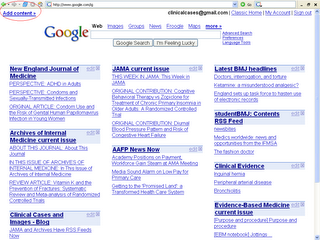 This is a collection of articles I have found interesting in the weekly editions of the "big five" medical journals: NEJM, JAMA, Annals, Lancet and BMJ (a few more journals are included occasionally). The review is a weekly feature of Clinical Cases and Images - Blog. Please see the end of the post for a suggested time-efficient way to stay up-to-date with the medical literature.
This is a collection of articles I have found interesting in the weekly editions of the "big five" medical journals: NEJM, JAMA, Annals, Lancet and BMJ (a few more journals are included occasionally). The review is a weekly feature of Clinical Cases and Images - Blog. Please see the end of the post for a suggested time-efficient way to stay up-to-date with the medical literature.------------------
Rosuvastatin to Prevent Vascular Events in Men and Women with Elevated C-Reactive Protein
NEJM Volume 359:2195-2207 November 20, 2008 Number 21
Increased levels of the inflammatory biomarker high-sensitivity C-reactive protein predict cardiovascular events. In this trial of apparently healthy persons without hyperlipidemia but with elevated high-sensitivity C-reactive protein levels, rosuvastatin significantly reduced the incidence of major cardiovascular events.
------------------
Diagnostic Performance of Coronary Angiography by 64-Row CT
NEJM Volume 359:2324-2336 November 27, 2008 Number 22
Multidetector CT angiography accurately identifies the presence and severity of obstructive coronary artery disease and subsequent revascularization in symptomatic patients. The negative and positive predictive values indicate that multidetector CT angiography cannot replace conventional coronary angiography at present.
------------------
Determinants and Time Course of the Postthrombotic Syndrome after Acute Deep Venous Thrombosis
Ann Intern Med 18 November 2008 | Volume 149 Issue 10 | Pages 698-707
The reason some patients with deep venous thrombosis (DVT) develop the postthrombotic syndrome is not well understood. In this study, patients with extensive DVT and those with more severe postthrombotic manifestations 1 month after DVT have poorer long-term outcomes.
------------------
Using Second-Generation Antidepressants to Treat Depressive Disorders: A Clinical Practice Guideline from the American College of Physicians
Ann Intern Med 18 November 2008 | Volume 149 Issue 10 | Pages 725-733
Recommendations: Assess patient status, therapeutic response, and adverse effects of antidepressant therapy on a regular basis beginning within 1 to 2 weeks of initiation of therapy; modify treatment if the patient does not have an adequate response to pharmacotherapy within 6 to 8 weeks; continue treatment for 4 to 9 months after a satisfactory response.
------------------
Disparities in Liver Transplantation Before and After Introduction of the MELD Score
JAMA. 2008;300(20):2371-2378.
In February 2002, the allocation system for liver transplantation became based on the Model for End-Stage Liver Disease (MELD) score. Before MELD, black patients were more likely to die or become too sick to undergo liver transplantation compared with white patients. Following introduction of the MELD score to the liver transplantation allocation system, race was no longer associated with receipt of a liver transplant or death on the waiting list, but disparities based on sex remain.
------------------
Depressive Symptoms, Health Behaviors, and Risk of Cardiovascular Events in Patients With Coronary Heart Disease
JAMA. 2008;300(20):2379-2388.
Depressive symptoms predict adverse cardiovascular outcomes in patients with coronary heart disease, but the mechanisms responsible for this association are unknown. this sample of outpatients with coronary heart disease, the association between depressive symptoms and adverse cardiovascular events was largely explained by behavioral factors, particularly physical inactivity.
------------------
Inhaled Corticosteroids in Patients With Stable Chronic Obstructive Pulmonary Disease
JAMA. 2008;300(20):2407-2416.
Among patients with COPD, ICS therapy does not affect 1-year all-cause mortality. ICS therapy is associated with a higher risk of pneumonia. Future studies should determine whether specific subsets of patients with COPD benefit from ICS therapy.
Click here for a relevant JAMA Patient Page.
------------------
Primary immunodeficiency: a call for multidisciplinary care — Authors' reply
The Lancet, Volume 372, Issue 9653, Page 1878, 29 November 2008
------------------
BMJ Career Focus
Medical CV writing skills
Interview skills
Exam technique is a 4-part series on exams:
Exam technique 1
Exam technique 2: performing
Exam technique 3: revision
Exam technique 4: study
------------------
Pay Now, Benefits May Follow — The Case of Cardiac Computed Tomographic Angiography
NEJM Volume 359:2309-2311 November 27, 2008 Number 22
------------------
The Lessons of Success — Revisiting the Medicare Story
NEJM Volume 359:2384-2389 November 27, 2008 Number 22
------------------
Innovation in Primary Care — Staying One Step Ahead of Burnout
NEJM Volume 359:2305-2309 November 27, 2008 Number 22
------------------
Emergence of Extensive Drug Resistance during Treatment for Multidrug-Resistant Tuberculosis
NEJM Volume 359:2398-2400 November 27, 2008 Number 22
------------------
A time efficient way to stay up-to-date with medical literature
"How do you eat in elephant? In small bites." The same rule probably applies to staying current with the ever expanding avalanche of medical literature. One can try the following approach:
1. Subscribe to the RSS feeds of the 5 major medical journals (NEJM, JAMA, BMJ, Lancet and Annals) plus 2-3 subpecialty journals in your field of interest.

Medical Journals tab: A screenshot of iGoogle with RSS feeds from the major medical journals.
2. Read the journal on the day it is published online, for example, NEJM on Wednesdays.
3. Use text-to-speech to listen to the articles you do not have time to read.
4. Listen to journal podcasts. Click here to subscribe the podcasts of the 4 major journals in iGoogle.
Related:
5 Tips to Stay Up-to-Date with Medical Literature
Make Your Own "Medical Journal" with iGoogle Personalized Page
Share iGoogle Tabs with Medical Journals, Podcasts and Gadgets
Text-to-Speech Programs and Continuous Medical Education
Image source: OpenClipArt, public domain.